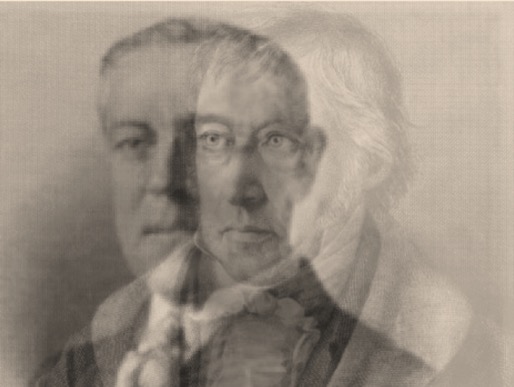The German Stamp on Wilson’s Administrative Progressivism

Paul Gottfried questions the connection between the American Progressives and German political thought—Hegel’s in particular. I’m not quite sure what he means by the “cottage industry” he attributes to me, but it is the case that this connection is an important piece of arguments made about the Progressives by me, John Marini, and others in the Claremont orbit. I will stick to the part of Gottfried’s essay that concerns Woodrow Wilson, since that should be enough to show that Gottfried conveys an inaccurate sense of my argument and an ignorance of the clear historical and textual connections between Wilson and the Germans.
Gottfried begins by shooting down a straw man when he proclaims that he does not find “large gobs of Hegel” in Wilson’s work, thus refuting by exaggeration a contention made neither by me nor anyone I know. He counters by pointing to the influence on Wilson of Burke and Bagehot, as if this were news and this influence were overlooked in my work. To the contrary, my monograph on Wilson has substantial sections on the clear influence of Burke, Bagehot and the English historical school, and I detail at some length the specific connections between Wilson’s constitutional and legislative ideas and Bagehot’s The English Constitution as well as Physics and Politics.
In fact, I find the influence of Bagehot’s realism to be so strong on Wilson that I devote an entire postscript to the irony of Wilson’s reputation as an “idealist,” when the evidence detailed in my book points much more to Wilson’s place among nineteenth-century liberal realists. My view of the influences on Wilson is that one has to understand the amalgam of the somewhat diverse historical thinking that was prominent in the nineteenth century—on both sides of the Atlantic. So there are elements of the English historical school, of various forms of social Darwinism, in addition to the German historicism that is also critical in getting at Wilson’s thought.
Having made clear that the variety of influences on Wilson has to be appreciated, it remains a gross error to downplay the German influence, as the evidence of it is so obvious. If anyone wants the long version of this, they are welcome to knock the dust off of the hundreds of pages of details, with citations, that can be found in my book and essays. For the present, I would point first to Wilson’s own critiques of Bagehot and the other historical writers whom he otherwise admired. His principal criticism of Bagehot was that Bagehot “did not construct for the future”—he admired the historical contingency of Bagehot’s evolutionary thinking, in other words, but thought Bagehot’s embrace of a philosophy of progress far too conservative. This is just one of the many places where Wilson’s historical realism slides into a more idealistic philosophy of history, as Wilson himself explained.
Gottfried is correct in pointing us to Wilson’s admiration for things British; he was an Anglophile in certain important respects, especially on matters of constitutionalism, which led him to a fierce criticism of separation of powers. But Wilson was at least as taken with the Germans. His educational pedigree was decidedly more German than it was British, for starters. Wilson did his graduate work at Johns Hopkins, which was founded in 1876 for the express purpose of bringing the German educational model to the United States, and which featured a faculty educated in Germany. Wilson’s two closest teachers at Hopkins were Richard T. Ely and Herbert Baxter Adams, both of whom had earned their doctorates at Heidelberg, and both of whom were disciples there of the Hegelian Johann K. Bluntschli. Bluntschli’s papers were housed at Hopkins in 1883, in the same seminar room where Wilson studied under Ely and Adams.
Oddly, Gottfried points to Wilson’s 1889 book The State as evidence against the German influence, apparently unaware of the German origins of this book. The work is so derivative of German sources that some scholars have actually raised the issue of plagiarism. There isn’t much to this charge, however, because Wilson himself freely acknowledged how much of it he lifted directly from the series on modern governments written by Heinrich Marquardsen—Handbuch des öeffentlichen Rechts der Gegenwart. In the Preface to The State—the same book that Gottfried would have us take as evidence against German influence—Wilson frankly acknowledges that his book would have been difficult or impossible were it not for the Marquardsen series. Add to this Wilson’s comment that he “wore out a German dictionary while writing” The State. And I don’t suppose others have missed what Gottfried appears to have missed—that the title of the book is The State, for Pete’s sake.
While it is true that the British and German influences on Wilson compete for place, and that one has to appreciate both of them, Gottfried’s downplay of the Germans is especially weird given the context of the present discussion—Marini’s work on the administrative state.
If there is any place in Wilson’s thought where the German influence wins out, it is on the question of administration. In what is probably his most influential piece of academic work—his 1887 article “The Study of Administration”—Wilson more or less urges the adoption of the Prussian administrative model in the United States. One of the more entertaining—and well known—parts of “The Study” finds Wilson grappling with how one might append an administrative system taken from a monarchy onto a republican constitution; to which end he reasons: “If I see a murderous fellow sharpening a knife cleverly, I can borrow his way of sharpening the knife without borrowing his probable intention to commit murder with it.” In urging the adoption of a foreign system of public administration, Wilson relies on the distinction between Politics and Administration—a distinction that becomes the hallmark of his contributions to the field of administration, and which he attributes directly to the Germans: “This is distinction of high authority; eminent German writers insist upon it as of course. Bluntschli, for instance, bids us separate administration alike from politics and from law.”
And while it’s not clear that The State had any influence at all, Wilson’s “Study” was among the foundational works in the field of public administration in America and is still the object of study among scholars in public administration and elsewhere. It is, by far, the most relevant and prominent of Wilson’s works to consider in any discussion of the Progressive origins of the administrative state.
And the reliance of Wilson’s discussion in “The Study” on Hegel’s Philosophy of Right is pretty hard to miss. Though, if one is inclined to miss it, Wilson makes it even more obvious by proclaiming at the outset of the work that “the philosophy of any time is, as Hegel says, ‘nothing but the spirit of that time expressed in abstract thought’” —a statement taken directly from the Preface to The Philosophy of Right.
This reliance on the Germans carried over from Wilson’s published works into his teaching. For a number of years Wilson traveled to Hopkins to teach a multi-week seminar on administration, and his lecture notes for that seminar are instructive: the bibliographic material for them lists almost entirely foreign sources, the majority of which are German.
One final point, with respect to Gottfried’s enlistment of Wilson biographer Arthur Link in his cause. The five-volume biography that Gottfried cites was written and published before Link’s other major accomplishment: the publication of sixty-three volumes of Wilson’s papers. These papers contained many items not previously known or read. (Among other reasons for this, Wilson wrote many of them in a kind of shorthand, which the Link team had to translate). Much of the scholarship that has come out after the papers, with the benefit of seeing writings from Wilson that had previously been unavailable, departs from the original Link biography on some of the points in contention here. Even Link himself, while never addressing the German question, published a revealing article in 1970 in which he reversed his earlier account of Wilson’s affection for the cause of The South. I mention this only because, the achievement of Link’s five-volume biography notwithstanding, it is not always the best authority given how much subsequent scholarship benefited from Link’s own later production of the Wilson papers.
The American Mind presents a range of perspectives. Views are writers’ own and do not necessarily represent those of The Claremont Institute.
The American Mind is a publication of the Claremont Institute, a non-profit 501(c)(3) organization, dedicated to restoring the principles of the American Founding to their rightful, preeminent authority in our national life. Interested in supporting our work? Gifts to the Claremont Institute are tax-deductible.
The Red Scare podcast brings a downtown dissident edge to the table.
The counter-universities defying wokeness in higher education.
The American ideal of self-government is increasingly inapplicable to our culture.
The communist history of using children to forward political goals.
Don’t be misled by peaceful protest.






